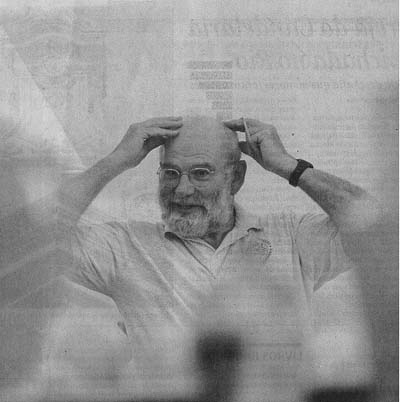Folha de S. Paulo

August, 18, 1997
To Sacks, sickness is a failed concept

Alexandra Ozorio de Almeida
Neurologist Oliver Sacks defends there's no categorical division between ill and healthy people. For him, the own concept of illness is doubtful - as many times the body finds other ways to do their functions - and treatments must be considered case by case.
Sacks explain his argument mentioning Virgil's case (of book "Anthropologist in Mars") who was blind, was cured and faced new problems.
Sacks, who has been living in New York for 30 years, is in Brasil to release his new book. Read the following interview.
Folha: How you define illness on opposite to heath?
Sacks: It's complex, because there's a great variation between both. I believe the concept of heath and illness must be redefined through the capacity of body to create a new organization, adequate to its necessities.
Too be ill usually means a part of the body isn't working, is damaged. And to be health isn't only one definition, as illness incorporates in the person's life.
Folha: for example?
Sacks: I found out the deaf people don't consider themselves defective. they say the sound isn't important and that they have a visual perception of the world.
There are cases as Virgil, who was practically blind since very early, due to cataract.
At 50, it was found there was an operation that could give his vision back. But it was a dazling experience, because he didn't know how to see. The brain learns to recognize the world. You need to learn how to see.
To find peace again, he closed his eyes and returned to the world he knew. I think, in this case, the effects of the change should be more discussed.
For me, it's the same. I have chronic insomnia and I consider it the illness of my life. On the other hand, I think a lot by night and I'm very active. Maybe, if I was cured, I would lose other things. You must think the pros ans cons when you treat someone.
Folha: How much is known about Neurology
the neurological knowledge is developing a lot. We know things about the analytical part of the brain. It was found out more than 40 different systems that handle things like colors or movement.
But we still know very few about how the brain synthetizes information.
And the sy,nthetic part is very important, because it gives emotion, feeling, consciousness.
Folha: And how safe is to treat people and use medicine drugs?
Sacks: In fact, there are few drugs for neurological disturbs. The ones which exist don't have an exact aim, they fits a series of illness. It's a little rude.
Within time, we gonna specialize ourselves even more, but this gonna bring a new series of medical and ethical discussions about illness, treatments and drugs. All we do, as neurosurgeries or medication, has a cost and this must be counted.
Folha: You work in the hospitals and participate of patients lives, knowing thei houses, for example. Where do you learn more, at laboratory or living together?
Both are equally important. The laboratory for me is Galapagos Island of Darwin. The hospital, the patients are my laboratory, but to feel people's lives, it must be outside.
Folha: How you see doctors who sometimes worry more about the illness than the patient?
I think it's very important to study the illness itself, for understanding it. But it's also important to know that behind the illness there's the patient.
In US, a lot of patients claim that doctors don't give them much attention - which isn't so important as the treatment itself. In my job, I try to ally medical knowledge to the concerns of the person.
Did you treat any brazilian patient?
Sacks: I don't think so. I would have serious problems, as I'm not good in languages and we must talk to patients... But it would be very interesting to see how is a brazilian autist, for example, because culture influences the treatment. Here, for example, I didn't see special access to deficients.
Folha: Is there a "Sacks' method of treatment"?
Sometimes some medicine student look for me to study "Sacks technique", but it doesn't exist.
What I do is simply hear and to be very attentional in what patients talk or do, and I try to ally this to the medical knowledges I have.
1997 Folha de Sao Paulo - Brasil. All Right Reserved
|
